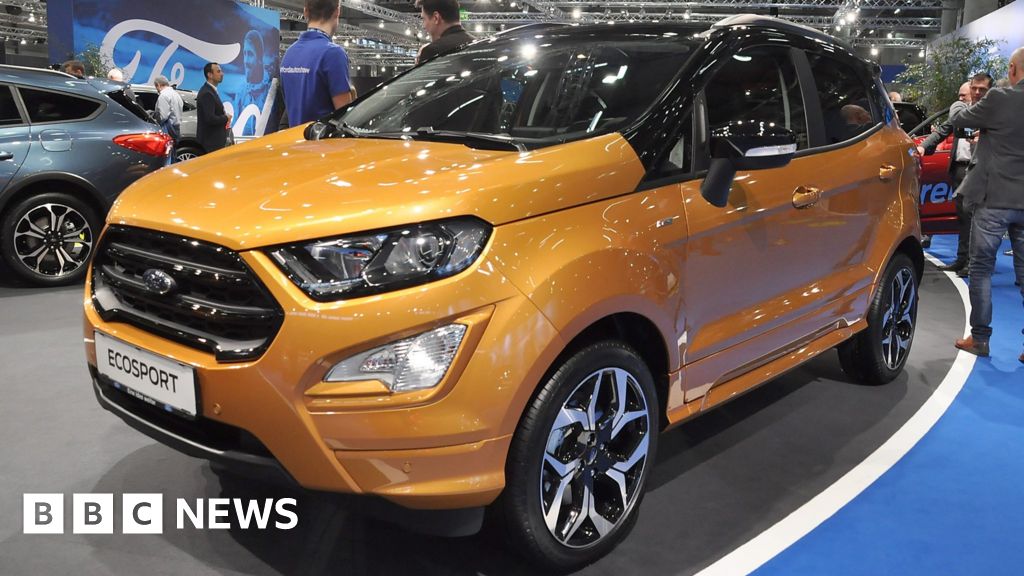Follow EU Regulation To Keep Costs Low, Says Ford Boss

Britain should continue following EU car regulations to avoid extra costs for consumers, says the boss of Ford.
Tim Slatter's comments come as car manufacturers prepare for the first major review of Britain's post-Brexit trade deal with the EU.
Some Brexit campaigners want the UK do more to set itself apart from the EU and to focus on markets beyond Europe.
But the chairman of Ford said UK car manufacturers believe their future lies mainly in Europe.
Speaking on the eve of the International Automotive Summit in London, Tim Slatter said: "It's really important that we maintain really good alignment to the European [regulatory environment] because that's where we build and sell most of our vehicles.
"Otherwise, what we're going to see is a lot of extra cost come into the cost of developing vehicles and producing vehicles and that can't be a good thing for customers."
The UK / EU Trade and Cooperation Agreement (TCA), which governs trade between Great Britain and the EU, is due to be reviewed in 2025-26. Northern Ireland is more closely bound to the EU under separate arrangements.
One result of the TCA deal is that it allows UK manufacturers to export into the EU with zero quotas and zero tariffs. To gain access to the single market, UK car manufacturers are obliged to follow EU regulations.
Britain is free to diverge from EU regulations. But if it does so, it will find that access to the EU market is restricted.
Mr Slatter told BBC Newsnight: "The trade and cooperation agreement remains the critical thing - frictionless trade, tariff free trade. It's very important that Great Britain maintains good regulatory alignment with the European Union.
"There are sort of three big regulatory environments for automotive in the world. There's the North American one, the European one and the Japanese one. And it's really important that we maintain really good alignment to the to the European one, because that's where we build and sell most of our vehicles."
The car industry is deeply concerned about one aspect of the TCA which is due to kick in next January: the "rules of origin".
Image source, Getty Images
Ford Transit vans remain a bestseller in the UK
From January 2024 UK cars sold to the EU - and cars sold in the opposite direction - could face a 10% tariff.
That will happen if electric cars built in the UK or the EU bust one or more of two targets: having more than 55% of any vehicle by value, or 40% of their battery, made from parts outside the EU and the UK.
The rule was drawn up by the European Commission to encourage both UK and EU car manufacturers to accelerate the production of electric vehicle parts in Europe. At the moment the European car industry is heavily reliant on supplies from China and South Korea.
UK and EU car manufacturers have been lobbying the European Commission to extend the deadline to 2027. Both sides will be hit as they sell into each other's markets.
But EU countries selling to each other will not face the tariff. This means the tariff would not have applied had the UK remained in the EU.
Tim Slatter said that car manufacturers cannot avoid the 10% tariff in January, which will mean that environmentally friendly cars will be penalised while carbon-emitting cars will not.
"We'll have this very unusual situation where the technology that we're trying to promote and government is trying to promote to help decarbonise our economy will be taxed and the traditional technology won't be taxed. And that's clearly not what was intended when the when this rules of origin regulation was put in place," said Mr Slatter.
It will represent a "double whammy", he added. The tariff would increase car prices for consumers, add costs to industry and undermine two key targets: increasing the production of Battery Electric Vehicles and ensuring all cars are Zero Emissions Vehicles.
Mr Slatter added that the timeline that was set out did not anticipate the complexity of achieving local manufacture - specifically on the battery within the battery cell.
"The cathode active material, which makes up about 50% of the value of the cell, is not yet produced in sufficient quantities, either in the UK or in Europe, to support the industry. And that's one of the key things which needs to be changed so that the industry can make this meet this rules of origin requirement," he said.
A government source told the BBC: "The Business and Trade Secretary has raised the rules of origin issues with her EU counterpart and is determined to ensure the UK remains one of the best locations in the world for automotive manufacturing, especially as we transition to electric vehicles."
From Chip War To Cloud War: The Next Frontier In Global Tech Competition
The global chip war, characterized by intense competition among nations and corporations for supremacy in semiconductor ... Read more
The High Stakes Of Tech Regulation: Security Risks And Market Dynamics
The influence of tech giants in the global economy continues to grow, raising crucial questions about how to balance sec... Read more
The Tyranny Of Instagram Interiors: Why It's Time To Break Free From Algorithm-Driven Aesthetics
Instagram has become a dominant force in shaping interior design trends, offering a seemingly endless stream of inspirat... Read more
The Data Crunch In AI: Strategies For Sustainability
Exploring solutions to the imminent exhaustion of internet data for AI training.As the artificial intelligence (AI) indu... Read more
Google Abandons Four-Year Effort To Remove Cookies From Chrome Browser
After four years of dedicated effort, Google has decided to abandon its plan to remove third-party cookies from its Chro... Read more
LinkedIn Embraces AI And Gamification To Drive User Engagement And Revenue
In an effort to tackle slowing revenue growth and enhance user engagement, LinkedIn is turning to artificial intelligenc... Read more

